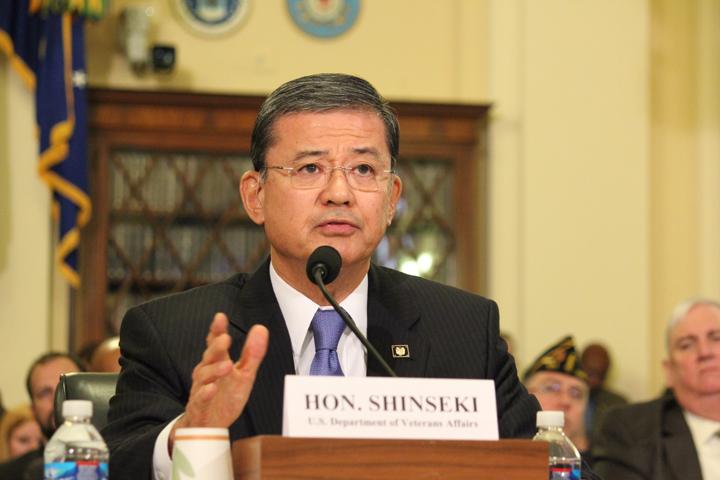WASHINGTON – Veterans’ Affairs Secretary Eric Shinseki warned House VA committee members Oct. 9 that if the shutdown doesn’t end soon, come Nov. 1, more than 5.18 million beneficiaries – including veterans, family members and a portion of active duty service members – may not receive some $6.25 billion in payments.
These checks, Shinseki said, cover pensions, education, employment benefits, and programs to help disabled veterans find and keep jobs.
“Let me just say that, unequivocally, that all the effects that I describe … of the shutdown are negative,” Shinseki said. “It is an impediment to the VA’s ability to deliver services and benefits that veterans have earned through their service.”
He said members of this latest generation of veterans are enrolling in VA programs at a higher rate than ever before – and that the department has been working to reduce the stack of claims backlogged.
But progress on the backlog has nearly halted – and Shinseki said in his written testimony that “This lapse in funds will likely increase the backlog,” and the 30 percent reduction the VA has made since March may backslide.
And efforts by House Republicans to pass individual appropriations bills – to open national parks and monuments, or only fully fund the VA – won’t solve all of the department’s problems, Shinseki said. He said that’s because the department works too closely with other federal agencies – the Department of Housing and Urban Development, Social Security Administration, Department of Defense and others – to not feel the trickle-down effects of the shutdown.
“These are not insignificant connections for this department. Without them we are less effective in serving veterans, service members, their families,” Shinseki said.
Another effect of the shutdown on the department is the increasing number of workers they may need to furlough if the lapse in appropriations continues. By the end of the month, Shinseki said a staff of around 13,000 workers may dwindle to little more than 1,100 – spread out over more than 50 regional centers.
So far, the Veterans’ Health Administration has escaped the shutdown’s squeeze because of an advanced appropriation measure passed last year to keep its hospitals, clinics and doctors’ offices open to veterans. Current VA construction projects will still continue as well, but ones that are still in the design phase, Shinseki said, may see delays – including a community-based outpatient clinic in South Bend, Ind. scheduled for construction in 2015.
But U.S. Rep. Jackie Walorski, R-2nd District, said the delays in the clinic’s construction are nothing new and not because of the shutdown – that since taking office she’s asked Shinseki about the slow progress numerous times.
She also cited a Monday Morning Report – saying that the Indianapolis regional office has a backlog of 11,460 claims – that takes an average of more than a year to process.
“That’s unheard of and is unacceptable,” Walorski said. “I have in my district over 53,000 veterans, in that one congressional district, and that doesn’t count their extended families. When you’re dealing with veterans’ health issues and PTSD, and the many health and mental issues that veterans are dealing with… they deserve the best quality care.”
Russ Eaglin, deputy director of the Indiana Department of Veterans’ Affairs, said as of noon Wednesday, the state department was notified that the regional VA office has suspended operations.
That means the state will not be able to verify claims that Hoosier veterans send in until the regional office is up and running again.
“We will continue to process claims as they come into our office, but part of that process is verifying with the VA that the veteran does have a disability, and that he’s a veteran,” Eaglin said, as an example of how the Indiana department will be affected.
“So we will accept the claims, we will process them as far as we can, and they will just stack up until the VA starts up again.”
He said there are around 500,000 Hoosier veterans, and the department receives one to two hundred claims a day.
In Shinseki’s written testimony, he said when the shutdown began, the Department of Veterans’ Affairs had to stop overtime, slowing down the department’s review of benefit claims. He wrote that “this has led to delays for an average of 1,400 veterans a day.”
The Veterans Benefits Administration furloughed more than 7,800 employees Tuesday, half of whom are veterans, he said. He said he expects more furloughs to department employees if the shutdown continues.
Jessica Wray is a senior journalism major at Franklin College in Franklin, Ind. She may be reached at [email protected].









